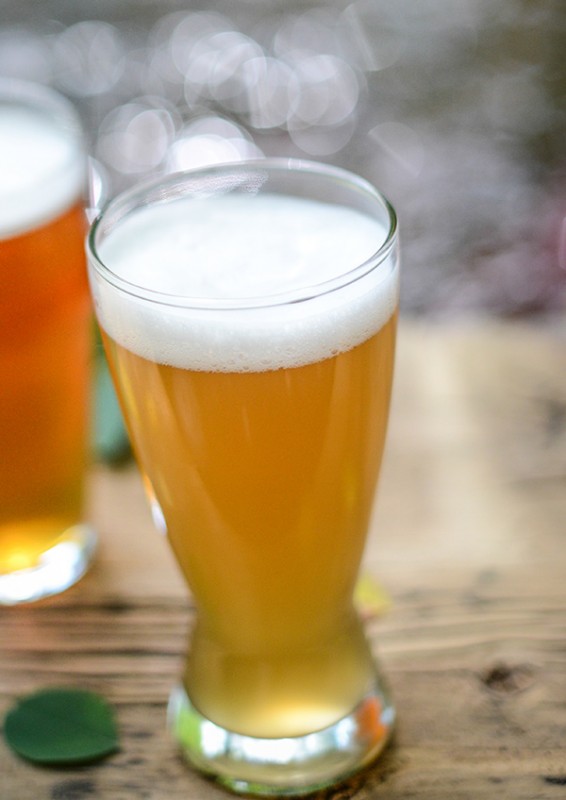
This might surprise you, but the monks who toil away making your favorite Belgian dark strongs and tripels aren’t typically quaffing their high-gravity creations. With strict schedules of religious observance, brewing and other daily tasks, the monks need to keep an even keel.
Instead, they brew a special light ale called patersbier (“Father’s Beer” in Dutch) to drink for sustenance, while leaving them fully capable to take on the day’s endeavors. If monk’s mowed their monastery yard (do they?), this would be the Belgian equivalent of a lawnmower beer.
Patersbier is also known as enkel, meaning “single” in Dutch. The style likely came about when monks did an additional sparge of a mash to extract leftover sugars. Once collected, it is brewed as its own beer and turned into a highly sessionable beer. This long-practiced brewing technique is known as parti-gyle.
Singles from Trappist breweries like Chimay, Orval and Westvleteran are rarely available outside their respective monasteries, making it highly sought after by beer hunters. Some secular Belgian breweries and American craft breweries have tried their hand at making their own singles, but the benefit of being a homebrewer is no style being out of reach!
Examples of the style vary from one brewery to the next, but they are generally dry, golden to light-amber ales coming in below 5 percent ABV with a noticeable dose of hops and a top-fermenting Belgian yeast, which makes for a thirst-quenching beer. Some recipes may also include adjuncts like sugars and spices. No matter the recipe, the end goal should always be something that can be sessioned as a nutritional source without inebriation.
So try your hand at brewing your own patersbier! It is a perfect drinker during the homebrew day: you can have a few and still remember the order of your hop additions!
Father’s Reward Enkel
This recipe is featured in “Seeing the Light: Belgian Session Beers” by Drew Beechum in the May/June 2009 issue of Zymurgy magazine. Access this issue instantly online or using the mobile apps.
Ingredients for 5.5 gallons (21 L)
- 6.0 lb (2.7 kg) | Belgian Pilsner malt
- 0.5 lb (0.2 kg) | Special B malt
- 0.25 lb (113 g) | Carafa malt
- 1.0 lb (0.5 kg) | Turbinado sugar
- 0.5 oz (14 g) | Styrian Goldings pellet hops, 4.7% a.a. (60 min)
- 0.5 oz (14 g) | Saaz pellet hops, 3.5% a.a. (15 min)
- 1/2 | Cinnamon stick (5 min)
- 1/8 tsp | mace, crushed (5 min)
- Wyeast 1762 Abbey II or White Labs WLP530 Abbey Ale
Specifications
- Original Gravity: 1.040
- IBUs: 12
- SRM: 16.0
Directions
Mash for 60 minutes at 152°F (67°C). Bring runoff to a boil and add 60 minute hops. Add hops and spices according to the recipe. After 60 minute boil, chill to 66°F (19°C). Ferment one week, allowing temperature to rise into the low 70s°F (21-23°C), then rack to secondary. Age two weeks then bottle or keg.
Extract Version:
Substitute 3.5 lbs (1.6 kg) of extra light dry malt extract for Pilsner malt, and increase 60 minute hops to 0.75 oz (22 g). Steep malt in 1.0 gallon (3.8 L) of water at 160°F (71°C) for 60 minutes. Strain and sparge into brew kettle with 0.75 gallon (2.8 L) of 170°F (77°C) water. Stir in extract, bring to a boil and add 60 minute hops. Boil 60 minutes, adding hops and spices according to the recipe. Strain into a fermenter with enough cold water to make 5.5 gallons (21 L). When temperature drops to 66°F (19°C), pitch yeast and aerate well. Ferment one week, allowing temperature to rise into the low 70s°F (21-23°C), then rack to secondary. Age two weeks then bottle or keg.